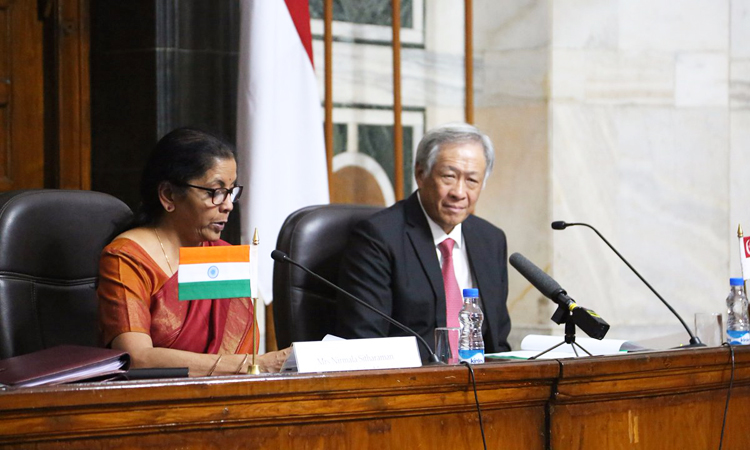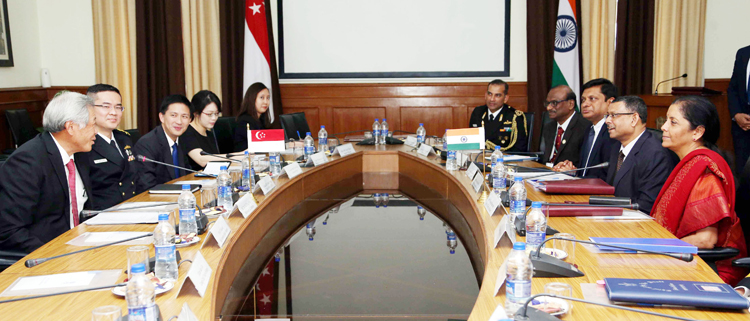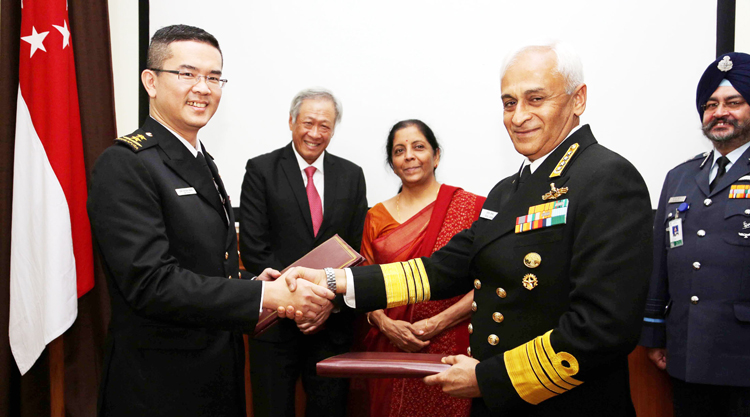INDIAN ARMED FORCES CHIEFS ON
OUR RELENTLESS AND FOCUSED PUBLISHING EFFORTS

SP Guide Publications puts forth a well compiled articulation of issues, pursuits and accomplishments of the Indian Army, over the years

I am confident that SP Guide Publications would continue to inform, inspire and influence.

My compliments to SP Guide Publications for informative and credible reportage on contemporary aerospace issues over the past six decades.
- Prime Minister witnesses 'Bharat Shakti' – a Tri-Services Firing and Manoeuvre Exercise in Pokhran, Rajasthan
- Interim Defence Budget 2024-25 — An Analysis
- Union Defence budget 2024
- Indian Army: In quest of greater firepower and policy recommendations for gaps
- Indian Army Annual Press Conference 2024
- 6G will transform military-industrial applications
India-Singapore Defence agreement

With twin objective of balancing the expanding footprints of Chinese Navy in the East Asian waters and creating a strong military base for 'Act East' policy, India and Singapore on November 29 signed India-Singapore Bilateral Agreement for Navy Cooperation which will provide berthing and logistic support to Indian naval ships at Singapore ports.
The agreement was signed during the 2nd Defence Ministers' Dialogue (DMD) between Indian defence Minister Nirmala Sitharaman and her visiting counterpart Dr Ng Eng Hen. The Navy Bilateral Agreement was signed by Singapore's Permanent Secretary of Defence Mr Chan Yeng Kit and India's Defence Secretary Sanjay Mitra at New Delhi.
"Of particular significance during this meeting was the conclusion of the India-Singapore Bilateral Agreement for Navy Cooperation, which will lead to increased cooperation in maritime security, joint exercises, temporary deployments from each other's naval facilities and mutual logistics support," said ministry of defence in a statement.
Both Ministers welcomed the renewal of the Air Force Bilateral Agreement on the sidelines of the 11th Singapore-India Defence Policy Dialogue in January this year, and looked forward to the successful renewal of the Army Bilateral Agreement next year which will be the 25th anniversary of the Singapore-India Maritime Bilateral Exercise.
Expressing his satisfaction on the outcome of his visit, Hen in a tweet said, "Indian Defence Minister @nsitharaman and I held the 2nd India-Singapore Defence Ministers' Dialogue and witnessed the conclusion and exchange of the Navy Bilateral Agreement. We agreed to step up engagements between our militaries. Very satisfied with the positive outcomes of this trip."
"I conveyed India's interest in continued professional training and interactions between the two armies. We also explored the possibilities for expanding collaboration in Defence R&D," said Sitharaman during the joint statement with her counterpart after the conclusion of the dialogue.

"India and Singapore remain strongly committed on tackling transnational security threats," she added.
Speaking after conclusion of the DMD, Dr Ng said, "What has marked this successful Defence Minister's Dialogue is the meeting of minds and shared perspectives from both Singapore and India with regard to our defence relations...We also discussed at length our desire to step up cooperation in the maritime domain...I was very thankful that we concluded the bilateral Navy agreement which will facilitate these measures, as well as agreed to look into, not only renewing the agreements between our Armies and our Air Forces, but to step up the level of engagements."
How Significant?
The significance of the agreement lies in the strategic location of Singapore, which is situated at the eastern mouth of Malacca strait- connects East Asian water with Indian Ocean- through which India trades with China, Japan, South Korea and East Asian countries. Two of India's biggest trading partners, namely China and ASEAN lie east of Malacca strait.
In recent past, Chinese navy has been violating the established global maritime norms in the South China Sea and is expanding its naval presence in Indian Ocean, jeopardising the security balance of the region. The East Asian countries look towards India as a balancing power. India also intends to expand its reach in East Asia through its 'Act East' policy. A logistic agreement with Singapore Navy will allow India to deploy its naval ship for longer durations without logistical hassles. This agreement also marks eastward shift of focus of Indian navy from Persian Gulf to Malacca.
The Tejas flight
Before heading towards Delhi to attend DMD, Dr Ng on November 28, visited Republic of Singapore Air Force (RSAF)-Indian Air Force (IAF) Joint Military Training (JMT) at Kalaikunda Air Force Station, West Bengal and also took a flight in India's Light Combat Aircraft 'Tejas'.
"Privileged to be flown on the #Tejas, India's own designed and manufactured fighter aircraft. A very good plane," said the minister in a tweet.
"I placed my life in the hands of Air Vice Marshall A.P. Singh as we flew 20,000ft above the #Kalaikunda skies in the @IAF_MCC's new Tejas #fighterplane. @TheRSAF pilots say he is among the best. The plane ride was so smooth despite the G-turns & manoeuvres - even took #selfies!," he added. AVM Singh is the Principal Director Test Flight at the National Flight Test Centre (NFTC), Aeronautical Development Agency.
LCA 'Tejas', which caught the fancy of the visiting minister, is an indigenous designed and developed single engine fighter aircraft manufactured by Bangalore based defence public sector Hindustan Aeronautics Limited. IAF has ordered over 100 LCA to populate its depleting squadron strength.
Speaking on the training exercise, Dr Ng appreciated India "for providing realistic and challenging training opportunities for the RSAF to hone its operational readiness."
"(It was) very impressive, and this is the reason why our air force trains with your (Indian) air force. Your pilots are superb, planes (are) equally good, and the RSAF gets immeasurable value from training here with you, and (with) experienced pilots like you...We have been having bilateral air exercises since 2004, and...I hope that these bilateral exercises will last very long," said Dr Ng.
The RSAF deployed six F-16C/D fighter aircraft to train with the IAF's Su-30 fighter aircraft in this year's JMT.
Later, during the day, while speaking at the Brookings Institution India Centre on India-Singapore security relations, Dr Ng called the relationship between the two armed forces as 'a unique relationship' and highlighted the strong bilateral defence relations between India and Singapore.

"Singapore and India share similar strategic perspectives and interests for a peaceful and progressive future...This is why both countries strongly advocate adherence to international law and norms, and the peaceful resolution of disputes," Dr Ng said while pointing towards the violation of laws of the seas by Chinese Navy.
Reiterating the shared strategic perspective of the two countries, he said, "We are both maritime nations that sit astride key trade and energy routes that link Europe to Asia. India has the Indian Ocean and we have the Malacca and Singapore Straits."
"India wants to do more to promote regional security. .. We will flesh out the details of Minister Sitharaman's proposal for increased multilateral interactions between India and other Southeast Asian nations in the Andaman Sea. Singapore strongly welcomes this proposal and we will facilitate it as the ASEAN Chair."
"For trade to flourish, not only is guarantee of freedom of navigation and overflight essential, but the absence of conflicts and tensions which can potentially disrupt trade. This is why both countries strongly advocate adherence to international law and norms, and the peaceful resolution of disputes," he added.
With the signing of the naval agreement, India is well placed to establish institutionalised naval engagements with like-minded ASEAN partners. The visit has started a process that has potential to make India an integral part of the ASEAN regional security architecture.





